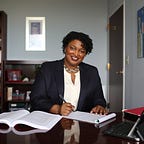Economic Security for Every Georgia Family
Many across Georgia struggle to take care of their families and to survive day to day. Medical debt, rising rents, credit card debt, student loans and more pile up, as folks juggle bills to make it all work. They stretch paychecks to the limit, and when there isn’t enough, they face the worry of falling short and falling behind.
I grew up in a family where my parents worked full-time and still found themselves and their six children trapped like so many of the working poor. Economic security can feel like an impossible goal when you’re living paycheck to paycheck, deciding between paying the light bill or the water bill, knowing the decision to pay either one may mean you can’t put food on the table. Add unexpected emergencies like illness or the responsibility for taking in a grandchild or an aging parent, and the cycle of income insecurity becomes endless.
Fundamentally, the solution to economic insecurity is economic prosperity — an achievable goal. But for anyone who has grown up without financial security, there’s a shadow that lies over even those who move towards independence: lack of financial literacy. Economic inequality is systemic, and one of the most effective barriers is ignorance about how money works beyond the basics. For my family, for me, and for countless others across Georgia today, it’s not simply lack of access to economic mobility, it’s that we are rarely taught the tools to help us get there. Instead, we fumble our way through, making mistakes that haunt us, sometimes grappling with shame because we wish we could do better.
When I got to Spelman College, I received my first credit cards, unaware that those cards were yoked to something called a “credit score.” I often used them to pay for the basics related to school and to help my family with their expenses, but when I missed making a payment or my payments were late, my credit score suffered. Modest sums became major, and it took years to settle those debts. Worse, the impact on my credit score — to get a good mortgage, to buy a car — lasted even longer.
I became a lawyer, one who earned a good salary, but income and wealth are not the same things. Income gets you through bad days; wealth can take you through tough years. I learned the stark difference in 2005 when Hurricane Katrina hit Mississippi, where my parents live. The storm ravaged the community, and the church they pastored could no longer afford to pay a full salary. A year later, my parents stepped in to take custody of my newborn niece, Faith, while still trying to get back on their feet.
Like thousands of Georgians who have responded to crisis, I stepped in and took on what I could. I covered my parents’ health insurance and medicines, paid their living expenses and helped them take care of Faith. To do so, I rearranged my financial life and stretched every penny I had. I never failed to file my taxes, but I had to pay my taxes late because I had used those dollars for my family. With my parents’ permission, I also negotiated with the IRS to be treated as head of household for them and my niece, as the person responsible for almost all of their resources. During that negotiation, the IRS erroneously filed a tax lien against me, but they eventually agreed with my petition. While delaying tax payments wasn’t my smartest move, it allowed me to take care of the parents who’d sacrificed so much for me and my siblings. I remain committed to their financial stability to this day, and I continue to work hard to meet all of my obligations.
The reality is, we are all going to make financial mistakes, and we have to own up to them and correct them. But the future is unpredictable, and unforeseen expenditures — like emergency medical bills, natural disasters, unexpected layoffs, or taking care of our loved ones — can happen to all of us. Learning how to navigate the competing financial priorities in our life is a skill we often learn by trial and error, not through training.
Over the course of this campaign, I have heard from Georgians from every walk of life about the financial challenges they face. Lisa, an electrician, is overwhelmed by high student loans payments — a problem made worse when her debt was combined with her spouse’s. Keith, who works for his family’s small business, has an unpredictable salary and often struggles to pay his credit card bills. Tonya and Andrew are a married couple who have faced a triple-whammy of unexpected layoffs, low savings accounts, and student loan debt. Chelsea is a single mom who also takes care of her parents as they face medical issues and expenses.
Our campaign is proposing detailed policies to strengthen families, their wages and their economic security. Our Georgia Economic Mobility Plan will increase incomes, lift families from poverty, reduce income inequality, and ensure a fair and inclusive economy for all Georgians. This plan will help the working class through a Georgia Earned Income Tax Credit, which will put thousands of dollars into the wallets of qualifying families each year. We will defend workers through new and stronger protections against wage theft. Our Cradle to Career Savings Program will invest in young people at the start of adulthood, whether they need support for their first rental payment, education or an unexpected opportunity; and the Georgia FinLit Initiative to improve financial literacy and resilience, as well as credit-building. You can read about it here: www.staceyabrams.com/economicmobilityplan.
I am running for governor because I personally understand the choices and the challenges we face, but I have a vision for Georgia where all families have the opportunity to thrive.
We want to hear from you: Please share your story here.
